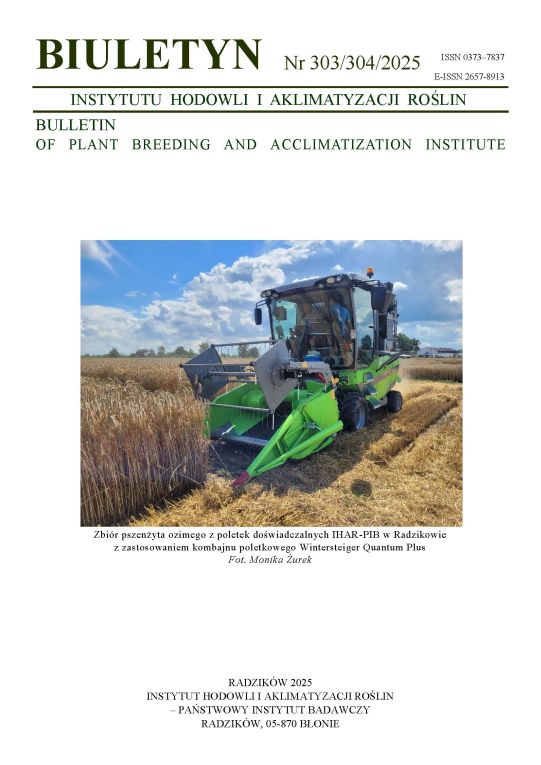Determination of storage losses for new potato cultivars
Genowefa Sowa-Niedziałkowska
g.niedziałkowska@ihar.edu.plZakład Przechowalnictwa i Przetwórstwa Ziemniaka, Instytut Hodowli i Aklimatyzacji Roślin, Oddział Jadwisin (Poland)
Abstract
The aim of the experiment was to determine storability of 25 new potato cultivars. The experiments were carried out in the seasons 1997/1998–2001/2002 at the Department of Potato Storage and Processing in Jadwisin. Potato tubers were always produced at the some location and were stored in a storehouse at 2°, 4°, 6°, 8°C (for table cultivars) and 2°, 4°, 6°C (for starch cultivars) at the relative air humidity above 90%. The following characters of varietal storability were assessed: physiological losses (natural and sprout losses) and infection of tubers with diseases. It was found that the cultivars were significantly differentiated in natural losses and losses caused by diseases. Losses caused by the diseases were dependent mainly on cultivar resistance.
Keywords:
diseases, natural losses, potato, storability, storage conditionsReferences
Burton W. G., van Es A., Hartmans K. J. 1992. The physics and physiology of storage. In: The potato crop. Ed. by Harris P. Second edition. Chapman and Hall. London: 608 — 709.
DOI: https://doi.org/10.1007/978-94-011-2340-2_14
Google Scholar
Carnegie S. F., Cameron A. M., Haddon P. 2001. The effect of date of haulm destruction and harvest on the development of dry rot caused by Fusarium Solani var. coeruleum on potato tubers. Ann. Appl. Biol. 139: 209 — 216.
DOI: https://doi.org/10.1111/j.1744-7348.2001.tb00397.x
Google Scholar
Gottschalk K. 2002. Potato storage — climate control — air flow methods and trends. Abstracts of 15th Trien. Conf. of the EAPR, Hamburg, Germany: 173.
Google Scholar
Hilton A. J., Stevenson L. R., Clayton R. C. 2002. Factors affecting dry rot of potatoes in storage. Abstracts of 15th Trien. Conf. of the EAPR, Hamburg, Germany: 174.
Google Scholar
Kushalappa A. C., Zulfiqar M. 2001. Effect of wet incubation time and temperature on infection and of storage time and temperature on soft rot lesion expansion in potatoes inoculated with Erwinia carotovora ssp. carotovora. Potato Res. 44: 233 — 242.
DOI: https://doi.org/10.1007/BF02357901
Google Scholar
Kuźniewicz M. 1982. Czynniki warunkujące występowanie chorób w czasie przechowywania ziemniaków oraz możliwości ograniczania ich rozwoju. Pr. doktor. Inst. Ziem. Bonin.
Google Scholar
Martin M. 2002. The use of different storage techniques to control the compartment of potato tubers. Abstracts of 15th Trien. Conf. of the EAPR, Hamburg, Germany: 159.
Google Scholar
Peters R. 1996. Damage of potato tubers, a review. Potato Res. 39: 479 — 484.
DOI: https://doi.org/10.1007/BF02358463
Google Scholar
Rastovski A. 1981. Storage losses. In: Storage of Potatoes. Rastovski A., van Es A. (ed.) PUDOC, Wageningen: 169 — 172.
Google Scholar
Sowa-Niedziałkowska G. 2000. Wpływ warunków wzrostu roślin i magazynowania bulw odmian jadalnych ziemniaka na ich trwałość przechowalniczą. Biul. IHAR. 213: 225 — 232.
Google Scholar
Sowa-Niedziałkowska G. 2001. Ocena odmian przydatnych do przetwórstwa spożywczego pod względem ubytków i strat w czasie przechowywania bulw ziemniaka. Biul. IHAR 217: 213 — 220.
Google Scholar
Thomas P. 1982. Wound — induced suberization and periderm development in potato tubers as affected by temperature and gamma irradiation. Potato Res. 25: 155 — 164.
DOI: https://doi.org/10.1007/BF02359802
Google Scholar
Authors
Genowefa Sowa-Niedziałkowskag.niedziałkowska@ihar.edu.pl
Zakład Przechowalnictwa i Przetwórstwa Ziemniaka, Instytut Hodowli i Aklimatyzacji Roślin, Oddział Jadwisin Poland
Statistics
Abstract views: 105PDF downloads: 22
License
Copyright (c) 2004 Genowefa Sowa-Niedziałkowska

This work is licensed under a Creative Commons Attribution-ShareAlike 4.0 International License.
Upon submitting the article, the Authors grant the Publisher a non-exclusive and free license to use the article for an indefinite period of time throughout the world in the following fields of use:
- Production and reproduction of copies of the article using a specific technique, including printing and digital technology.
- Placing on the market, lending or renting the original or copies of the article.
- Public performance, exhibition, display, reproduction, broadcasting and re-broadcasting, as well as making the article publicly available in such a way that everyone can access it at a place and time of their choice.
- Including the article in a collective work.
- Uploading an article in electronic form to electronic platforms or otherwise introducing an article in electronic form to the Internet or other network.
- Dissemination of the article in electronic form on the Internet or other network, in collective work as well as independently.
- Making the article available in an electronic version in such a way that everyone can access it at a place and time of their choice, in particular via the Internet.
Authors by sending a request for publication:
- They consent to the publication of the article in the journal,
- They agree to give the publication a DOI (Digital Object Identifier),
- They undertake to comply with the publishing house's code of ethics in accordance with the guidelines of the Committee on Publication Ethics (COPE), (http://ihar.edu.pl/biblioteka_i_wydawnictwa.php),
- They consent to the articles being made available in electronic form under the CC BY-SA 4.0 license, in open access,
- They agree to send article metadata to commercial and non-commercial journal indexing databases.
Most read articles by the same author(s)
- Tadeusz Gruczek, Barbara Lutomirska, Genowefa Sowa-Niedziałkowska, Susceptibility of potato varieties to mechanical damages and storage losses , Bulletin of Plant Breeding and Acclimatization Institute: No. 232 (2004): Regular issue
- Genowefa Sowa-Niedziałkowska, The influence of potato cultivar and conditions of storage upon the length of tuber dormancy period and intensity of sprouting , Bulletin of Plant Breeding and Acclimatization Institute: No. 232 (2004): Regular issue
- Genowefa Sowa-Niedziałkowska, The indicators of physiological processes in seed potato tubers during long-term storage , Bulletin of Plant Breeding and Acclimatization Institute: No. 233 (2004): Regular issue
- Genowefa Sowa-Niedziałkowska, The indicators of physiological processes in seed potato tubers during long-term storage , Bulletin of Plant Breeding and Acclimatization Institute: No. 233 (2004): Regular issue
- Genowefa Sowa-Niedziałkowska, Determination of optimum storage temperature of seed potato tubers of different cultivars in 9-degree scale , Bulletin of Plant Breeding and Acclimatization Institute: No. 223/224 (2002): Regular Issue













